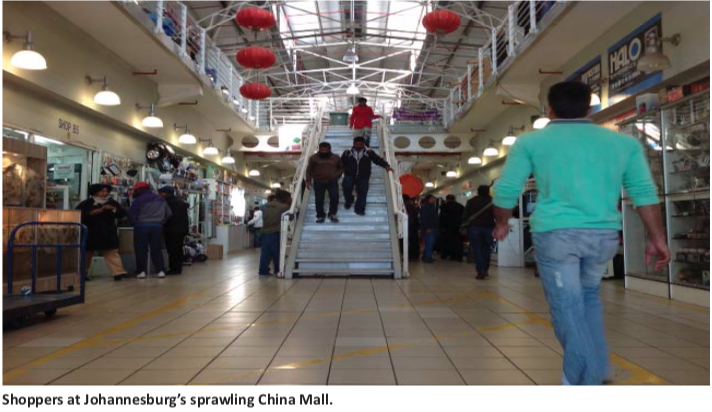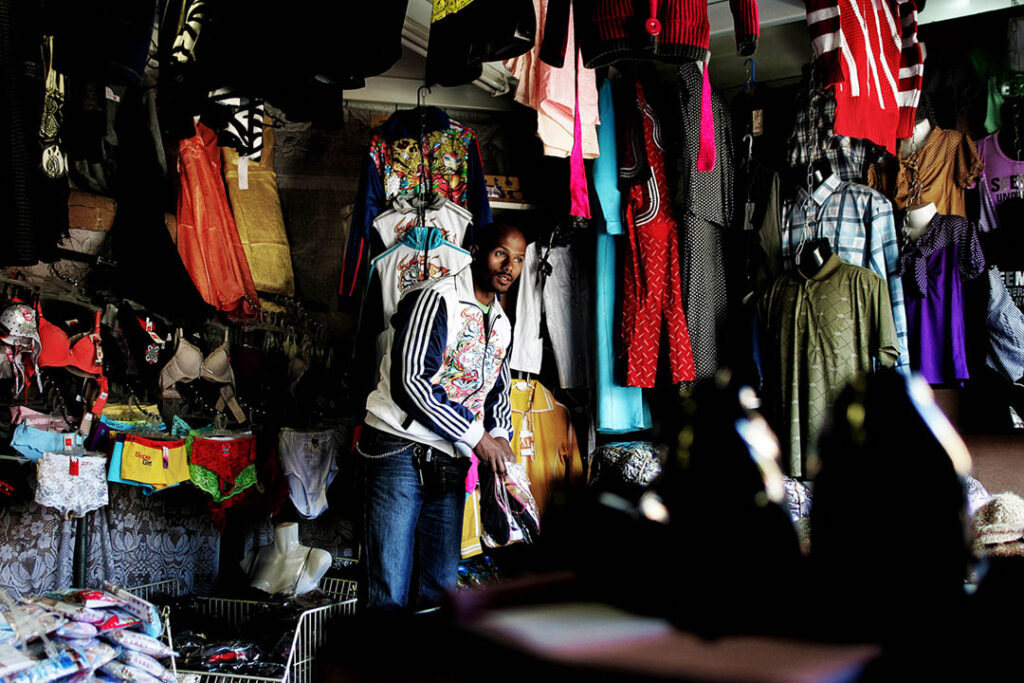The Chinese government’s interest in Africa is highly visible. It has paid for public buildings such as Lesotho’s parliament building and the African Union’s headquarters in Addis Ababa, in addition to promoting considerable investment in infrastructure. Less visible is the investment from Chinese individuals and families who come to Africa on their own account to trade and build businesses.Khadija Patel takes a closer look at what drives and troubles them.
At the sprawling China Mall in Johannesburg, Roy Qin runs a women’s clothing store, one of scores of shops in this hangar-like shopping centre. As he steam irons new stock, the 35-year-old ponders his last eight years in South Africa. “I like it a little bit,” he responds in heavily accented English. “It is easy to make money here. The big problem is too much criminals.”
Mr Qin is one of the growing number of Chinese traders who sell cheap textiles and plastic wares in Africa’s cities and rural areas. Though China’s booming interest in Africa’s oil, gas and other natural resources is well documented, little is known about these immigrants who are often China’s poorest and least-educated. They have left behind their homeland to make a better living, but if given half a chance would return to China or settle somewhere else.
They complain about crime, corruption, loneliness, language difficulties and xenophobia. Their African clients do not like them. When they are in trouble they have no one to turn to: neither the local police nor their own compatriots in the local consular offices. As tension rises between these migrants and their new neighbours, they may find themselves on the front lines of China’s foreign policy. Beijing may have to revise its non-interventionist policy.
These are among the findings in a report released last April by the Brenthurst Foundation, a South African-based think tank. Through 186 interviews with Chinese traders in Angola, Botswana, Lesotho, South Africa and Zambia between April 2011 and February 2012, the survey reveals how Chinese traders perceive their life in Africa.
The majority of traders in southern Africa come from China’s Fujian Province, on the coast across from Taiwan, the survey revealed. Jobless as a result of agrarian reform, the commercialisation of the fishing industry and other factors, the Fujianese have migrated to 90 countries and make up one-fourth of China’s diaspora. Yet Africa is the least settled by overseas Chinese.
Like other immigrants throughout the world, the Chinese establish networks that help other family members and friends to arrive. Once here, they face a life of sacrifice and hard work, often sleeping four to six in humble dwellings or in their shops to cut costs. Their hours are long and often they work every day throughout the year. They have little or no social lives and only mingle amongst themselves, according to the survey.
For these traders, not unlike their fellow African residents, crime is their major concern. Police intimidation is another. Chloe Chen also runs a women’s clothing store at China Mall. She’s bobbing her head to the Chinese pop music blaring out of a set of speakers above her head as she helps a customer conclude a purchase. She smiles amiably, inviting conversation as the Chinese music is replaced by Indian pop. “I like this song,” she says. “It’s Indian.” She has lived in South Africa for five years. She lists crime and the police ahead of any other difficulty she faces. She claims Chinese people are singled out by corrupt police officers who harass them by demanding to see immigration documents and then brazenly solicit bribes, even if the papers are in order.
Georgie Ma, 43, sells imitation jewellery in a shop in the same mall. He’s standing in the doorway of his little shop chatting animatedly to a group of traders that have congregated outside the shop next-door. He has been in South Africa for 20 years and claims to be content with his life here. He has one gripe: “Too much tsotsis [gang members],” he says. Then he points to a newspaper on the counter,China News SA, one of three Chinese-language newspapers printed in South Africa. “Here they tell us about all the bad things that happen to Chinese,” he says grimly.
A representative from the Chinese newspaper, who declined to identify himself, was willing to speak about the stories covered in his publication: “I have to say, the most scary story in our newspaper is about the crime,” he said. “As we all know, the crime in SA [South Africa] is becoming more and more serious. Most of the crime is to kids and women, and foreigners. Criminals see Chinese people as rich and cash flush so it’s easier for these criminals to lock their target on Chinese. To the Chinese, another problem is the misbehaved police.”
According to a 2006 paper by the South African Human Rights Commission, “Criminals along with police have learned to exploit foreigners’ vulnerability. As a result, foreign nationals are far less likely to feel secure on the streets, even during the day. In Johannesburg, 81% of foreigners felt unsafe compared to 38% of South Africans.”
The Brenthurst study found similar levels of dissatisfaction with the police among traders. “Nearly all of our Johannesburg subjects had experienced numerous run-ins with the police, especially on the city’s roads, where they felt most exposed,” said Terence McNamee, who wrote the Brenthurst study. “Harassment and demands for payments by traffic cops had become so routine that they tried to avoid driving where possible.” In Angola and Zambia, more than 90% of respondents in the survey complained of police or official corruption, while in Lesotho it was nearly 80%.
The nature and severity of the corruption varied considerably, from relatively mild harassment by local police seeking small bribes or food to major abuses by customs or immigration officials who solicited large fines for real or concocted transgressions. Tellingly, numerous traders in the Brenthurst study blamed their fellow Chinese migrants for encouraging corruption. A trader in Luanda from China’s southern province of Guangxi put it this way: “The Chinese culture of solving problems by money makes them [police and immigration officials] believe that we have money.”
These immigrants arrive in Africa with little or no experience, moving from the lowliest position in a shop to owning their own small business. “Research suggests that traders in Africa are making about three times what they might theoretically earn in China,” the Brenthurst study says. Ma says competition is much fiercer in China. “Here, we work and we can make money,” he says.
Though they are significant employers of Africans, ranging from an average of eight in Angola and Lesotho to two in South Africa, the Chinese believe the locals do not like them. A trader from Fujian said the locals in Lesotho think “that we are here to rob them”.
The Chinese mistrust their new neighbours and think little of their work ethic. “One trader from Sichuan [in south-western China] spoke for many when he remarked that ‘Africans are never in a hurry, they don’t save, the day after pay day, nobody comes to work,’” according to the Brenthurst study. In Zambia, the traders fear the repercussions of leaving their local staff alone in their shops.
Many of the merchants long to return to China or to move somewhere else besides Africa. They cite high crime and corruption and the low quality of their lives, but also increasingly their fear of the rising resentment among locals. The Africans accuse the Chinese of cheating them, not just out-competing them, the study said. They complain of the low quality of the Chinese goods and the trader’s business practices, particularly their lack of a returns policy.

Should tension continue to escalate over the merchants’ activities, China may have to establish a more formal relationship with its citizens living in Africa. “Chinese traders have become the whipping boy for Africa’s politicians, merchants, consumers and unions angered by the effects of Beijing’s growing ties to the continent,” the Brenthurst study says.
These communities may become too large for Beijing to ignore and may test its non-interventionist policy. “Chinese traders—the most vulnerable of China’s migrants— could occasionally find themselves on the frontline of their country’s foreign policy,” the study says.
For now, the traders feel isolated and abandoned, particularly by Chinese diplomatic and consular officials. According to the survey, 95% of the respondents said they had never received any assistance from the Chinese embassy.



